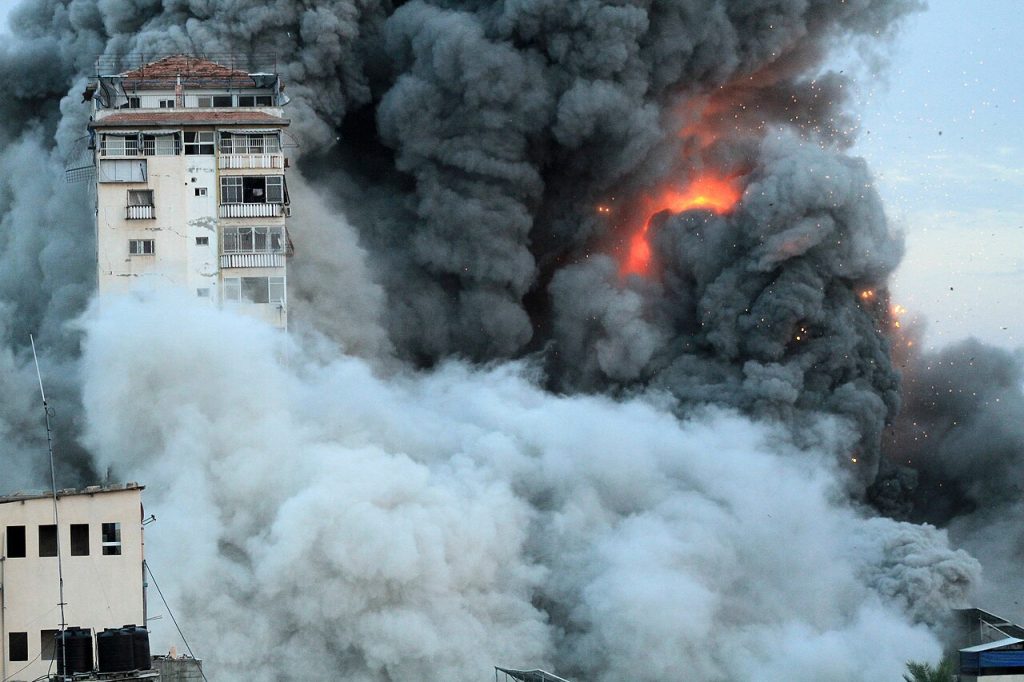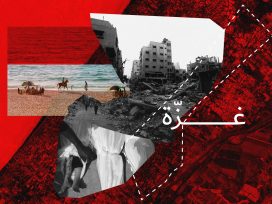
Layers of dispossession
Soundings 87 (2024)
On the geography of Israeli settler colonialism; queer perspectives on the war in Ukraine; the experiences of Afghan ‘returnees’; and the familiar pattern of UK Labourism.
Syria, Ukraine, Nagorno-Karabakh and now Gaza: connecting all recent wars is disregard for national sovereignty as recognised by international law. Confident of impunity, anti-democratic regimes cite sovereign interests as justification for their politics of annihilation.
On 7 October 2023 an Islamist organization committed a mass crime that it glorified as an act of resistance. The response was a scorched-earth campaign targeting a territory spanning a mere 360 square kilometres, justified as a ‘war against terrorism’ and the vengeance of Samson betrayed. More than 11,000 ‘targets’ were bombed and 1,400,000 members of the total population of 2,300,000 displaced in the space of a few weeks.
Everything, or nearly everything, had already been said about this conflict well before that fateful date: about how any chance of a political solution to the Palestinian question disappeared after the assassination of Israeli Prime Minister Yitzhak Rabin on 4 November 1995; about the devastating consequences of the Second Intifada, which began shortly before the destruction of the Twin Towers in New York and which was also distinguished by its suicidal tactics; about the extreme enfeeblement of the Israeli left, which partly explains the crisis of democracy in the country, now dominated by a political class as cynical as it is corrupt, embodied in the person of Benjamin Netanyahu.
We had also talked about the collapse of the defeated Palestinian left, which lingers on as a shadow of its former self, ignoring Palestinian society’s calls for greater democracy while confiscating the few resources that remain; about Hamas’s brutal control over the Gaza Strip, which has become an ‘open-air prison’ and a staging ground for jihadism’s parodies of Armageddon; and we had talked of an ‘international community’ that is more concerned with normalizing relations between Israel and the Arab countries than with resolving the old problem that has prematurely aged generations of Israelis and Palestinians since 1948.
Everything, or nearly everything, had already been said about the limits of Israeli security policy, so self-assured before everything came crashing down on 7 October. On 27 December 2008, during a previous war in Gaza, Dan Harel, then Israel’s Deputy Chief of the General Staff, proclaimed: ‘We are not only striking terrorists and rocket launchers, but the entire Hamas government. We are targeting official buildings, security forces, and we are making Hamas responsible for everything that happens, with no distinctions between its different branches. The battle is just beginning. The hardest part still lies ahead, and we need to be prepared for that. We want to change the rules of the game’.1

Gaza City, October 2023. Image: Ali Hamad of APAimages, for Wafa. Source: Wikimedia Commons
The war currently being waged on this narrow strip of land is even more destructive than those that have preceded it. It will do nothing to resolve the underlying conflict, let alone make Israel any safer. Of this we can be certain.
Still, we need to go beyond these facts to understand what this war can tell us about the human condition in a part of the world that in the last decade has seen a clear increase in the frequency and brutality of armed conflicts, of which only a fraction manage to generate interest from outside.2
Following the work of others,3 we can trace connections between the suffering in Syria at the hands of the Assad regime for more than a decade, including the destruction of the Yarmouk Palestinian refugee camp near Damascus in 2018; the occupation of Crimea and the war in Donbas in 2014; the occupation of the town-district of Afrin by Turkish-backed forces in 2018 – ‘cleansed’ of its Kurdish population and transformed into a ‘Jihadistan’ after seventy-two days of aerial bombing; the complete obliteration of the Armenian region of Nagorno-Karabakh in October 2023; and the massacre committed by Hamas and the war in Gaza.
Common to all these events is the involvement of anti-democratic regimes, either locked in cut-throat competition or engaged in close collaboration.4 Vladimir Putin’s decision to occupy Crimea in 2014 and launch a war against Ukraine came after US president Obama refused to honour his commitment to sanction the Assad regime for its use of chemical weapons against civilians in eastern Ghouta in late 2013. The occupation of Afrin took place with approval from Moscow, which presented itself as ‘Pro-Kurd’ while seeking to punish the Syrian Kurds who had collaborated with American forces while improving relations with Ankara. Nagorno-Karabakh was ethnically cleansed with a green light from the Kremlin, the historic ‘friend and protector’ of Armenians. During both phases of the war Azeri-Armenian war, not only Ankara, but also Jerusalem, following its own cynical logic, provided military aid to Baku.
The 7 October attack was planned by a secret group within Hamas, probably acting autonomously. Must we recall that, along with its ally Palestinian Islamic Jihad, Hamas is part of the ‘axis of resistance’ led by Tehran? The ongoing war in Gaza is seen in Russia as a kind of reprieve. Putin’s armies may have made little progress in their attack on Ukraine since February 2022, but at least the public eye has shifted its attention elsewhere and the master of the Kremlin can frame himself as the defender of the Palestinians, boosting his popularity in Arab countries and the ‘Global South’.
Reacting to the impunity following the horrors of the Ghouta chemical weapons attack, Putin stated that the West had ‘lost its honour and virility’; he seemed to believe that the door had been left open to advance his plans for an imperial Russia ‘which can have no borders’. Ankara, too, knew that it could get away with its policy of extortion; within two years after occupying Afrin, Turkey went back on the offensive to occupy a new area of Syria, taking it from Kurdish forces with the complicity of the Trump administration.
In 2020, the President of Azerbaijan, Ilham Aliyev knew that Putin remained the final arbiter of any conflicts in the Caucasus, but also that he had the green light to attack Nagorno-Karabakh. In 2023, he could happily note that the Russian President had neither the power nor the will to intervene, and that the much-vaunted ‘West’ was far removed and paralysed. Finally, holding Iraq and Lebanon for ransom after quashing the revolts in both countries in 2019 with the help of its allies, Iran remains convinced as ever that the Westphalian system is giving way to the rule of strength and extortion.
In each of these examples, the logic of sovereignty has nothing to do with the system of international law that divides the world into state-controlled territories. The sovereign entity is considered not as an internationally recognized state with borders that define its limits and its ‘zone of violence’,5 but as a ‘nation’ whose existence is threatened by another in an almost biological fashion. The survival of this sovereign nation demands the non-existence – in other words the annihilation – of the ‘enemy nation’ or its deterritorialization through deportations. The right to ‘self-defence’ is no longer limited by the laws of war, let alone the law of nations.
The wars being waged in the name of these sovereign ethnic/national and non-state entities are wars of de-civilization. Civilization is a contradictory process that imposes limitations, especially when it comes to the use of violence against others. But in return it allows us to orient ourselves more securely in time and space.6 No society can exist if it is restricted to stasis or has its mobility limited, if it doesn’t have a past to draw on as a resource, or as a way to project itself into the future. But neither can a society exist if its authorities, militias and affiliated paramilitary groups resort to violence at will, resulting in all-out war and the rejection of universal values.
In historical perspective, the current war in Palestine poses the question of the democratic legitimacy of the State of Israel, the Palestinian Authority and Hamas. Let us begin with Israel, since the history of Europe is also Jewish history. Like the Roman god Janus, Israel bears two countenances: founded by elites from the Zionist left who saw in it the possibility of a socialism separate from Soviet totalitarianism, it is also an eschatological touchstone for apocalypse-minded Americans who see the establishment of an earthly Jerusalem as necessary for the foundation of the New Jerusalem. The Holocaust is, of course, part of European history. Although not the only driving factor behind the founding of the State of Israel in 1948, it left the indelible reminder of Europe’s betrayal of its Jewish population and of itself. Israel can thus be seen both as an outpost of the ‘West’ in the Arab world and as its guilty conscience, tied to Europe by the double recognition of this debt.
Israel’s historical and democratic legitimacy, however, has not fared well in recent decades, with the rise of a radical, perhaps even supremacist Right, along with endemic corruption among the political class surrounding Likud, and the formation of a security-focused ‘hegemonic bloc’ concerned above all with advancing the colonization of the West Bank. Israel is in the throes of a democratic crisis that is by no means unique to the country, but when combined with the Palestinian question, assumes new dimensions.
Taken hostage by Arab states and the cynicism of both sides in the Cold War, the Palestinian cause gained undeniable legitimacy in the early 1990s, at the time of the First Intifada, when both the Madrid Conference and Oslo Accords marked some progress. No democratic force in Europe or the United States can now claim that the Palestinians are not a people with no national existence, without territorial continuity even in the roughly 20 per cent of historic Palestine they have occupied since 1967.
Nor can any democratic government sanction the building of fortified Israeli settlements, connected with special roads and protected with walls that deprive the Palestinian population of their freedom of movement. Who could deny that this is a conquered people, surviving in the ‘melancholy of the vanquished’ so vividly described by Ibn Khaldun in the fourteenth century? 7
The crisis of legitimacy that has weakened this society must also be emphasized. The official representatives in Ramallah have refused many times to organize internal Palestinian elections, losing all democratic legitimacy and leaving President Mahmoud Abbas, born in 1935, less and less influential over the years. Hamas, meanwhile, has abandoned any claim to democratic legitimacy by adopting jihadist discourse, by refusing to recognize Israel, by maintaining alliances with the Assad regime and Iran, and by putting the Gaza Strip under armed occupation and taking control of its resources. Bit by bit, Hamas has been able to use the legitimacy of the Palestinian cause to gain acceptance within the international community, and even from Israeli authorities, as a de facto regional presence and potential negotiating partner.
After the October 7 attacks, several of the organization’s leaders admitted that they had worked for many months to convince the Israeli authorities that they were not interested in a confrontation but only in economic prosperity. But though Hamas celebrated October 7 as a major act of resistance, it certainly presented no existential threat to Israel. And although the attacks seem to have done no harm to the legitimacy of the Palestinian question, at least in the official statements coming from Europe and the United States, the same cannot be said for Hamas. The organization has received (largely symbolic) support only from Iran, Hezbollah in Lebanon, the Popular Mobilization Forces in Iraq, and the Houthis in Yemen, as well as tepid support from Turkish President Erdoğan and the Kremlin.
We have very little information on what pushed Hamas to take such action. Some explanations, such as preventing closer ties between Israel and Saudi Arabia or trying to push Iran and the Arab world into full mobilization against Israel, are not credible. Rather, it seems as if Hamas was responding to the arrogance of Israeli power with its own form of hubris, as could be seen in the first statements it released. Perhaps Hamas thought that the entire history of Palestine, Israel, the Middle East, and the world could be concentrated into a few hours of supposedly decisive action. Such rejections of rationality are not specific to Hamas. However, the fact remains that sheer disregard for rational thought was the trigger for the war now devastating Gaza.
The times we live in are dark, but the future may hold more catastrophic scenarios still, from the de facto expulsion of the population of the Gaza Strip to further massacres by Hamas. What is needed first is a jolt of conscience within Israeli society, which now more than ever needs to follow the teachings of Hillel: ‘That which is hateful to you, do not do to another’(Babylonian Talmud, Shabbat 31a).
Next, there needs to be a realization within Palestinian society, Arab societies, and among pro-Palestinian activists around the world that national resistance does not justify mass atrocities. Even more important is grasping the connection between civic and historical awareness, learning the lessons of past tragedies8 and heeding what Heinrich Heine had to say:
Worse than owing any money, surely, are the debts that our ancestors have left us to pay. Every generation is the continuation of that which preceded and must answer for its failures. As it says in Scripture, the parents have eaten sour grapes, and the children’s teeth are set on edge. There is solidarity between the generations that come after the other, and as new peoples enter the ring, they take on this solidarity themselves, so that in the end, the whole of humanity liquidates the great debt of the past.9
This kind of historical awareness, which democracies can and should encourage, helps us understand that even if the past offers few sources of pride, there is no reason that the future must be the same. The Book of Jeremiah contains an important nuance that Heine perhaps deliberately omitted, but that we can restore:
Just as I watched over them to uproot and tear down, and to overthrow, destroy and bring disaster, so I will watch over them to build and to plant, declares the Lord. In those days, people will no longer say: The parents have eaten sour grapes, and the children’s teeth are set on edge. Instead, everyone will die for their own sin; whoever eats sour grapes – their own teeth will be set on edge.’ (Jeremiah 31:28–30)
It is up to Israeli and Palestinian society to secularize and de-eschatologize this message and envision a radically different future.

Published in cooperation with CAIRN International Edition, translated and edited by Cadenza Academic Translations.
Cited in Gilles Paris, ‘Israël et les illusions d’une solution militaire à Gaza’, Le Monde, November 3, 2023, accessed January 10, 2024, https ://www.lemonde.fr/idees/article/2023/11/03/israel-et-les-illusions-d-une-solution-militaire-a-gaza_6197966_3232.html. Translator’s note: Our translation. Unless otherwise stated, all translations of cited foreign language material in this article are our own.
See Emma Beals and Peter Salisbury, ‘A world at war: What is behind the global explosion of violent conflict?’ Foreign Affairs, October 30, 2023, accessed January 10, 2024, https://www.foreignaffairs.com/africa/world-war.
See Gaïdz Minassian, ‘Trois guerres en interaction, en Ukraine, à Gaza et dans le Haut-Karabakh’, Le Monde, November 2, 2023, accessed January 10, 2024, https ://www.lemonde.fr/idees/article/2023/11/02/haut-karabakh-ukraine-gaza-trois-guerres-en-interaction_6197831_3232.html.
See Hamit Bozarslan, L’Anti-démocratie au xxi siècle. Iran, Russie, Turquie (Paris, CNRS Éditions, 2021).
Anthony Giddens, The Nation-State and Violence: Volume 2 of A Contemporary Critique of Historical Materialism (Berkeley/Los Angeles, University of California Press, 1987), p. 120.
See Hamit Bozarslan, Crise, violence, dé-civilisation. Essais sur les angles morts de la cité (Paris, CNRS Éditions, 2019).
See Hamit Bozarslan, ‘Quand les sociétés s’effondrent. Perspectives khaldûniennes sur les conflits contemporains’, Esprit 1 (January 2016): pp. 30–44, doi : https://doi.org/10.3917/espri.1601.0030.
See Maxime Rodinson, Peuple juif ou problème juif ? [1981] (Paris, La Découverte, 1997).
Heinrich Heine, Memoires, online at: https://www.projekt-gutenberg.org/heine/memheine/memhein4.html Cited in Stathis Kouvélakis, Philosophie et révolution de Kant à Marx [2003] (Paris, La Fabrique, 2017), p. 121.
Published 24 January 2024
Original in French
Translated by
Cadenza Academic Translations
First published by Esprit 12/2023
Contributed by Esprit © Esprit / Hamit Bozarslan / Eurozine
PDF/PRINTSubscribe to know what’s worth thinking about.

On the geography of Israeli settler colonialism; queer perspectives on the war in Ukraine; the experiences of Afghan ‘returnees’; and the familiar pattern of UK Labourism.

Israel has imposed different forms of settler colonialism across the map of historic Palestine, but nothing can be taken for granted. The refugee camp is itself a spatialization of a political demand, a space of waiting for an eventual return.